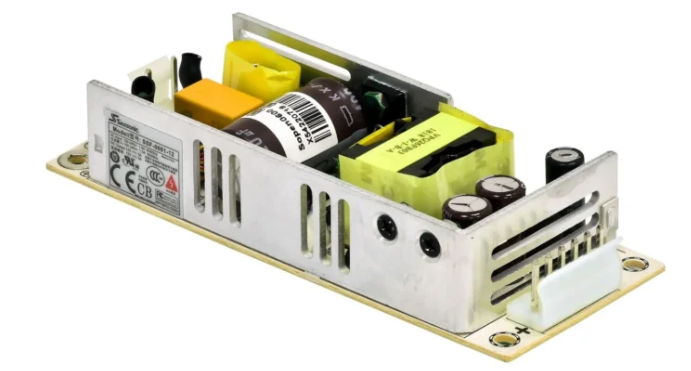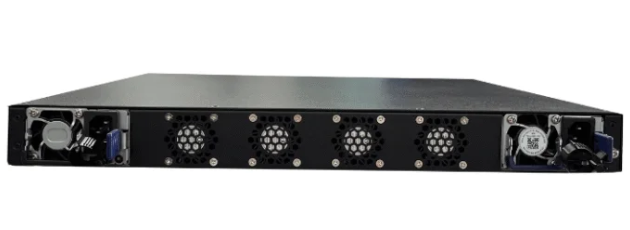If you want the best CPU air cooler right now, check out the Noctua NH-D15 G2. It stands out for its quiet operation and top-tier cooling, making it perfect for gaming or heavy workloads. Here’s a quick look at top choices for different needs:
| Need | Top Pick |
| Overall | Noctua NH-D15 G2 |
| Budget | Arctic Freezer 36 |
| Quiet | Be quiet! Dark Rock Pro 5 |
| Low-Profile | Cooler Master Hyper 212 Halo |
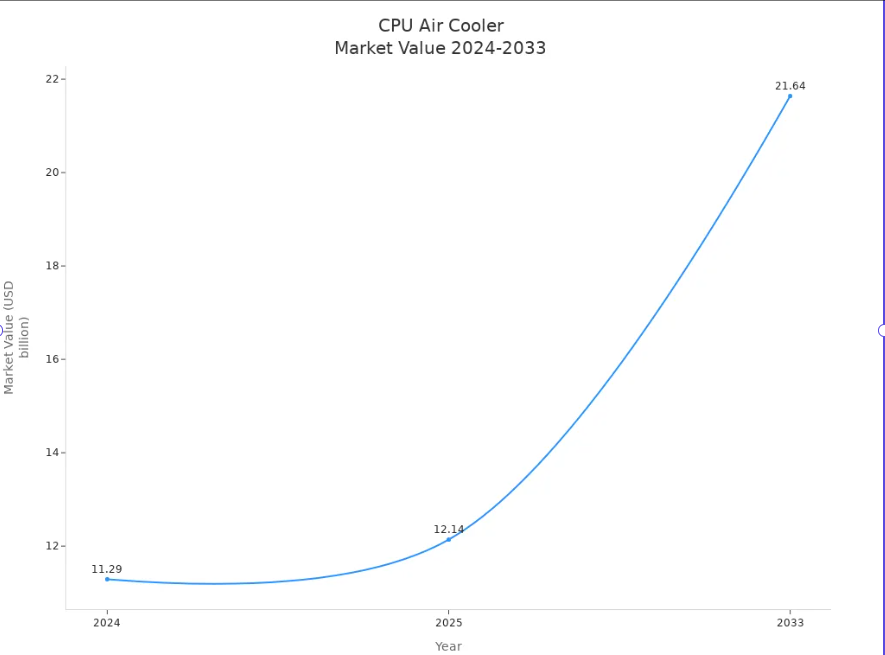
The Best CPU air cooler market keeps growing fast, so you’ll find more smart features and better performance every year. Keep reading for honest reviews and real-world tips.
Key Takeaways
The Noctua NH-D15 G2 is the top CPU air cooler for quiet and powerful cooling, ideal for gaming and heavy tasks.
Choose a cooler that fits your case size and matches your CPU socket and TDP rating to avoid installation issues and overheating.
Budget coolers like the Arctic Freezer 36 offer solid performance and quiet operation without breaking the bank.
Quiet coolers such as BeQuiet! Dark Rock Pro 5 help build silent PCs without sacrificing cooling power.
Regular cleaning and fresh thermal paste improve cooler performance and keep your CPU running smoothly.
Best CPU air cooler
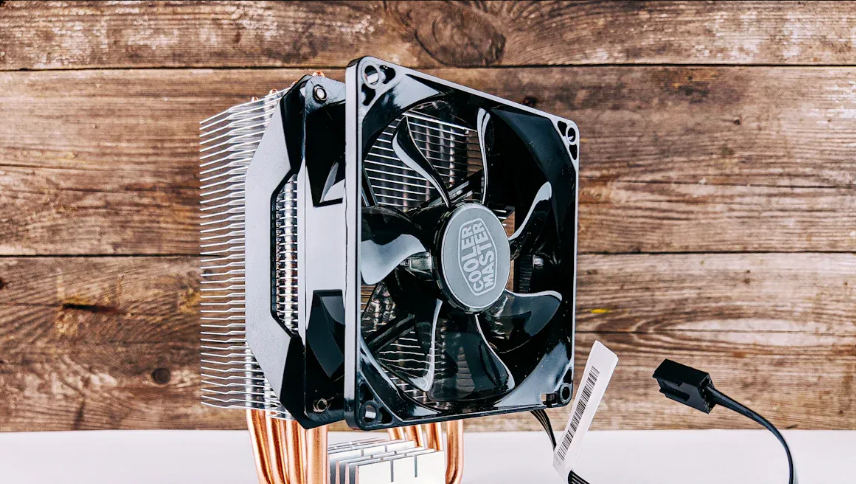
Top Pick
If you want the Best CPU air cooler for your system, the Noctua NH-D15 G2 stands out above the rest. You get top-tier cooling, even when you push your CPU hard with gaming or heavy tasks. This cooler keeps your processor cool and quiet, so you can focus on your work or play without distractions. Independent benchmarks show that the Noctua NH-D15 G2 leads in thermal performance, especially under high stress. Here’s a quick look at how it compares to other top coolers:
| CPU Air Cooler | Cooling Configuration | Average Temperature Over Ambient (°C) | Notes |
| Thermalright Venomous-X | High-output Yate Loon fan | 36.75 | Best overall performance on overclocked i7-930 at 1.40V, consistently leading benchmarks |
| Scythe Mugen 2 | High-output fan | 37.02 | Close second, excellent value, but slightly behind Venomous-X |
| ProlimaTech Megahalems | High-output fan | 37.66 | Strong performance, trailing leader by 0.91°C |
| Zalman CNPS10X-Performa | High-output fan | 37.97 | Good budget option, close to top performers |
| Titan EVO NK85TZCS2 | High-output fan | 37.81 | Competitive performance near top coolers |
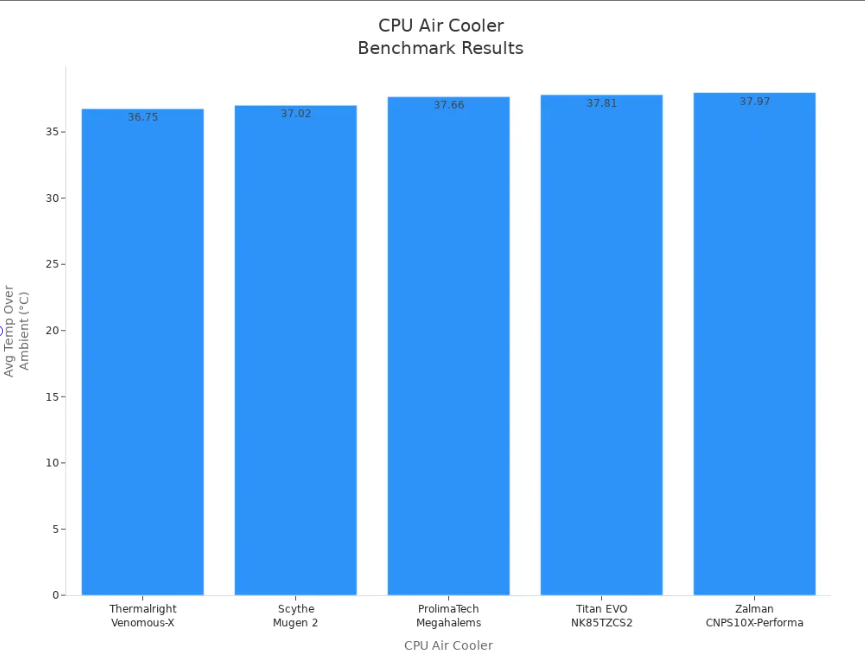
You can see from the chart that the top pick keeps temperatures lower than most other options. This makes it a great choice if you want the Best CPU air cooler for both performance and peace of mind.
Runner-Up
The ID Cooling Frozn A720 Black takes the runner-up spot. You get balanced thermal performance on both Intel and AMD systems. This cooler works well for most users and comes at a much lower price than the top pick. Here’s why it stands out:
Delivers strong cooling for both Intel and AMD CPUs.
Keeps noise levels reasonable, even under load.
Costs about $56, which is much less than premium models.
Dual-tower design helps with cooling but may need extra space in your case.
Offers broad compatibility and great value for the price.
If you want a cooler that handles most tasks without breaking the bank, the Frozn A720 Black is a smart pick.
Value Choice
Looking for the best bang for your buck? The Thermalright Phantom Spirit 120 EVO is your answer. This cooler gives you excellent thermal performance at a price that’s hard to beat. In 2024, it costs less than half of some premium models but still matches or beats them in cooling tests. You get a cooler that fits in more cases, runs cool, and saves you money. The Phantom Spirit 120 EVO is the value leader for anyone who wants the Best CPU air cooler without spending a fortune.
Tip: When you choose a cooler, always check that it fits your case and doesn’t block your RAM slots. Big coolers work best, but you need to make sure they fit your build.
If you want more details or want to compare other models, sites like GamersNexus offer up-to-date reviews and charts. They test coolers for noise, cooling, and fit, so you can trust their results.
Top Picks Overview
Budget
If you want great cooling without spending a lot, you have some strong options. The Arctic Freezer 36 stands out for its value. It gives you solid cooling and stays quiet, even when your CPU works hard. Many budget coolers now use smart designs and better materials. This means you get more performance for your money. You can also find coolers with RGB lighting and easy installation, even at lower prices. The market keeps growing, so you have more choices than ever.
Quiet
Do you want a silent PC? You should look at coolers known for low noise. Many users love the BeQuiet! Dark Rock Elite and DeepCool Assassin IV. These coolers have special switches that let you pick between quiet and performance modes. Noctua fans, like the A12x25, also get high marks for silent operation. Here’s a quick look at some top choices:
BeQuiet! Dark Rock Elite: praised for quiet cooling and high user satisfaction.
DeepCool Assassin IV: strong cooling with low noise, unique fin design.
Noctua A12x25 fans: trusted for silent builds.
You can build a quiet system with any of these coolers.
Low-Profile
Small form factor builds need special coolers. You want something that fits tight spaces but still cools well. Here are some top picks for low-profile coolers:
ID-Cooling IS-55: compact, easy to mount, works with many AMD boards, and fits low-profile RAM.
Thermalright AXP120-X67: strong cooling, but mounting options are limited.
Noctua L12 Ghost Edition: flexible mounting, rotates in 90-degree steps for better fit.
These coolers work well in mini PCs or HTPCs. They balance size, cooling, and compatibility.
Overclocking
If you plan to push your CPU, you need a cooler that can handle extra heat. The Best CPU air cooler for overclocking gives you both power and peace of mind. Here’s a table with some top choices:
| Cooler Name | Max Heat Dissipation (W) | Noise Level (dBA) | Key Features | Price (USD) |
| Thermalright Phantom Spirit 120 EVO | 238 | Quiet | Dual tower, VRM cooling, 3yr warranty | ~$43 |
| Peerless Assassin 120 SE | >200 | 34.5 | Whisper-quiet, VRM cooling | ~$36 |
| Noctua NH-D15 G2 | Top-tier | 24.8 | Six heat pipes, two 140mm fans | Premium |
These coolers keep your CPU cool, even when you overclock. You get strong performance and quiet operation.
Specs and Features
Cooling
When you pick a CPU air cooler, you want to make sure it can handle the heat your processor puts out. The most important number to check is the TDP, or Thermal Design Power. TDP tells you how much heat your CPU makes when it works hard. Your cooler should have a TDP rating that matches or beats your CPU’s TDP. For example, if your CPU has a turbo power of 154W, you need a cooler that can handle at least 154W. Some top air coolers, like the DeepCool AK620, can handle up to 260 watts. That means you can use them with powerful or overclocked CPUs and still keep things cool. Even if you have a CPU with a TDP around 95W, many high-end coolers will do the job easily.
Tip: Always check the TDP rating before you buy. This helps you avoid overheating and keeps your system stable.
Noise
Nobody likes a noisy computer. Good air coolers keep your CPU cool without making a racket. Most coolers run quietly during normal use. For example, popular models like the Wraith Stealth, Spire, and Max usually stay around 32 dB when running at about 40% fan speed. That’s about as loud as a quiet room. Even at full speed, these coolers rarely get too loud unless your CPU is under heavy load. The noise often sounds like a soft hum, so it won’t bother you while you work or play.
| Cooler Model | Noise Level at 100% Fan Speed | Typical Noise Level at ~40% RPM |
| Wraith Stealth | ~42 dB | ~32 dB |
| Wraith Spire | ~48 dB | ~32 dB |
| Wraith Max | ~55 dB | ~32 dB |
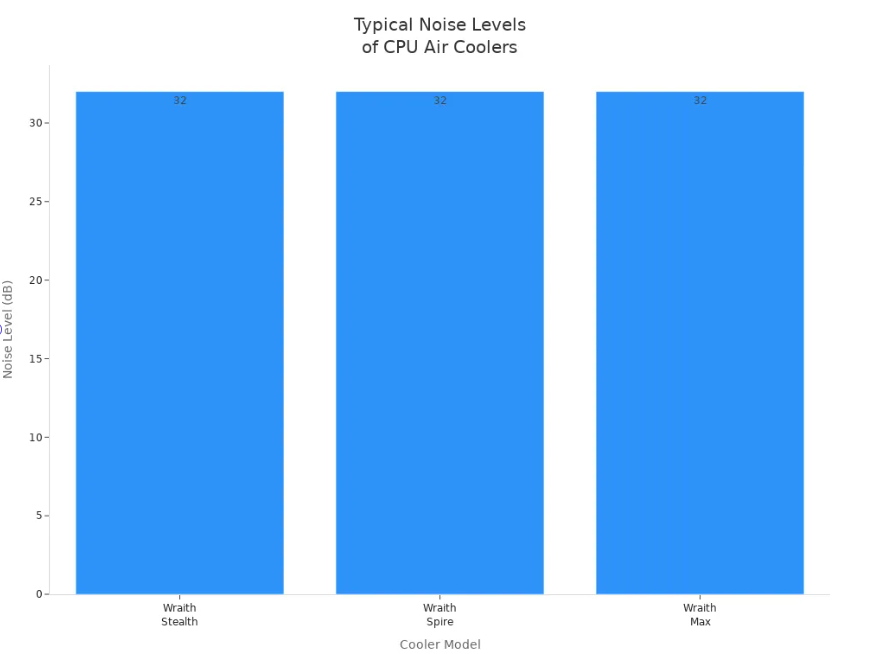
Compatibility
You want your cooler to fit your CPU and your case. Most popular air coolers support a wide range of CPU sockets. For example, some low-profile coolers work with Intel LGA115X/775 and AMD FM2+/FM2/FM1/AM3+/AM3/AM2+/AM2 sockets. The Noctua NH-L9A-AM4 fits AMD AM4 CPUs and is only 37mm tall, so it’s great for small cases. Many coolers also fit standard and large cases, with fan sizes like 120mm or 140mm.
Evercool Low Profile Heat Pipe CPU Cooler: Fits Intel LGA115X/775, AMD FM2+/FM2/FM1/AM3+/AM3/AM2+/AM2
Noctua NH-L9A-AM4: Fits AMD AM4, only 37mm tall, perfect for small builds
Works well in Mini-ITX, HTPC, and 1U server cases
| Cooler Size | Supported CPU Socket Types |
| 120mm, 240mm | Intel: 1700, 1200, 1150, 1151, 1156, 2011, 2066, 1366; AMD: AM4, AM5, sTR4 |
| 140mm | Intel: 1851, 1700, 1200, 1150, 1151, 1156; AMD: AM4, AM5 |
Note: Always check your case size and CPU socket before you buy a cooler. This helps you avoid surprises during installation.
Comparison
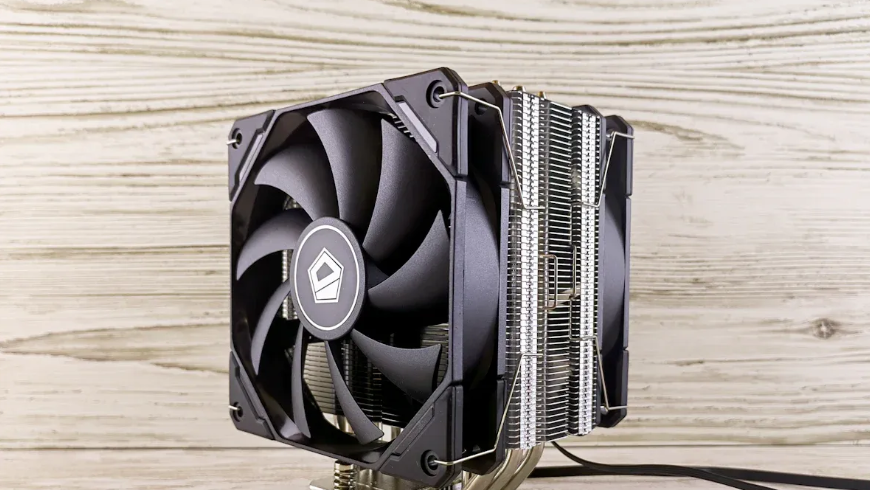
Performance
When you look at the best CPU air coolers, you want to know how they handle heat when your computer works hard. Some coolers do a better job at keeping your CPU cool, even with powerful chips like the 7950X or 9950X. Here’s a quick table to show you how the top models stack up:
| Cooler Model | Thermal Performance Under Load | Noise Level / Normalized Performance | Extra Notes |
| Noctua NH-D15 G2 | Keeps 7950X and 9950X under 90-92°C; almost no throttling; handles 200+W loads easily | Quieter than most AIOs; second fan lowers noise | Needs RAM clearance; fits small cases with tweaks; lasts a long time |
| Thermalright Phantom Spirit 120 SE | Slightly better than Peerless Assassin 120 SE; great for AM5 builds | Good noise-to-cooling ratio; fits better in cases | Fan swaps can boost cooling; strong value |
| Peerless Assassin 120 SE | Not as cool as Phantom Spirit 120 SE, but still solid | Similar noise, less cooling | Good for tight budgets |
| DeepCool AK620 Digital | Handles high heat (up to 260W); great for strong CPUs | Competitive noise | Has ARGB lights and digital display; modern look |
| be quiet! Dark Rock Pro 4/5 | Runs quieter, but doesn’t cool as well as the others | Very quiet, less efficient | Costs more for less cooling; not the best for heavy loads |
You can see that the Noctua NH-D15 G2 leads the pack for both cooling and quiet operation. The Phantom Spirit 120 SE also stands out, especially if you want a cooler that fits more cases and still keeps things chilly.
Value
You might wonder if spending more on a cooler really helps your PC. Here’s what you should know:
Coolers over $50 only drop temperatures by about 2°C compared to cheaper ones.
These small changes don’t really boost your gaming or daily tasks.
Your CPU model matters more for speed than your cooler does.
High-end coolers (over $100) give you quieter fans, longer life, and more room for overclocking.
Some brands, like Noctua, offer free mounting upgrades, which can save you money later.
A better cooler can protect your expensive CPU and help it run faster for longer.
If your CPU costs less than $300, a cooler under $50 usually gives you the best deal.
Tip: For most people, a budget-friendly cooler like the Peerless Assassin or DeepCool models will do the job. You only need to spend more if you want the quietest system or plan to push your CPU to its limits.
Buying Guide
Fit
You want your CPU cooler to fit your case and work with your parts. Start by checking the height of the cooler. Some big coolers might not fit in smaller cases. Always look at your case specs to see the max cooler height allowed. Next, check the RAM slots. Large air coolers can block tall RAM sticks. If you use memory with tall heat spreaders, you may need a cooler with more clearance or low-profile RAM. Also, make sure the cooler matches your CPU socket. Most coolers list the sockets they support, so double-check before you buy.
Tip: Use a tape measure to check space inside your case. This helps you avoid surprises during installation.
Here’s a quick checklist for fit:
Cooler height vs. case clearance
Socket compatibility
Space around the CPU for fans and heatsinks
Price
CPU air coolers come in many price ranges. You can find budget models like the Arctic Freezer 36 for around $30. Premium models, such as the Noctua NH-D15 G2, cost much more and offer top performance. Most people spend about 3-7% of their total PC budget on a cooler. If you have a high-powered CPU or plan to overclock, it makes sense to invest in a better cooler. For light use or office work, a budget cooler will do the job.
| Model | Price Range (2024) | Notes |
| Arctic Freezer 36 | ~$30 | Great value |
| be quiet! Dark Rock Elite | ~$115 | High-end performance |
| Noctua NH-D15 G2 | Premium | Best CPU air cooler |
Note: Spending more often means quieter fans, better cooling, and longer lifespan.
Installation
Installing a CPU air cooler can be easy or tricky, depending on the model. Some coolers use pushpins, while others need a backplate. Large coolers may require you to remove your motherboard from the case. Watch out for sharp heatsink fins and tight spaces. Sometimes, the fan or mounting clips can get in the way. Take your time and follow the instructions step by step.
Lay out all parts before you start.
Check that screws and clips are the right length.
Be careful not to scratch your hands on the heatsink.
If you have a dual-tower cooler, make sure both towers sit evenly.
Tip: Clean dust from your case and cooler before installing. Good airflow keeps your Best CPU air cooler working well.
Choosing the Best CPU air cooler depends on what you need for your PC. Here’s a quick look at top picks and their strengths:
| Cooler | Strengths |
| Noctua NH-D15 / NH-D15S | Quiet, powerful, great build |
| Cryorig H7 Tower | Smart airflow, good value |
| Cooler Master Hyper 212 Evo | Reliable, budget-friendly |
When you shop, remember these tips:
Check your CPU socket and case size.
Pick a cooler with a TDP rating higher than your CPU.
Balance noise, size, and price for your setup.
Use the guide above to find the right cooler for your build.
FAQ
What size CPU air cooler should I get?
You should check your case’s maximum cooler height. Measure the space from your CPU to the side panel. Most mid-tower cases fit coolers up to 160mm tall. Always check your RAM clearance, too.
Do I need to replace the thermal paste?
Yes, you should use fresh thermal paste when installing a new cooler. Most coolers include a small tube. If you reuse an old cooler, clean off the old paste first.
How often should I clean my CPU air cooler?
You should clean your cooler every few months. Dust can build up and block airflow. Use a can of compressed air or a soft brush to remove dust from the fins and fans.
Can I use any air cooler with my CPU?
Not every cooler fits every CPU. You need to check the socket type and TDP rating. Most coolers list supported sockets in their specs. Always match the cooler to your CPU for the best results.

